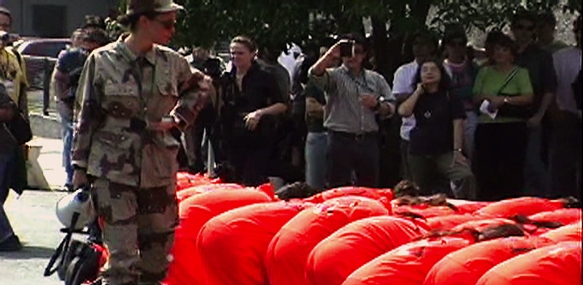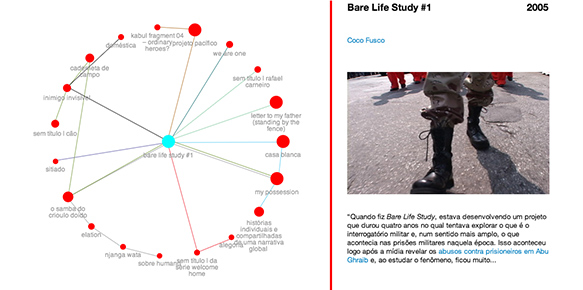Coco Fusco
The main topics of Coco Fusco’s work include geography and identity issues, gender, power relations and government policies (with an emphasis on the US).The artist builds her critical commentary using performances, photographs, videos and installations. Fusco, who was awarded the Guggenheim Fellowship in 2013, has had her work exhibited at institutions such as Tate Gallery (Liverpool, United Kingdom), the Museum of Modern Art (New York, US) and the Museu d'Art Contemporani de Barcelona (Spain), and has taken part in events such as the Whitney Biennial (USA), Mercosur Biennale (Brazil) and Transmediale (Germany).
In 2001, in response to the September 11 attacks, the United States president George W. Bush declared ‘war on terror’ in the name of democracy, with the goal of eliminating terrorist organizations. Suspects were either found dead or imprisoned at facilities in Guantanamo and Abu Ghraib. In 2003 and 2004, photographs and videos surfaced exposing the atrocities inflicted by the US army upon its political prisoners. In a statement available from Channel VB, Coco Fusco says the mild reactions of artists to the Iraq War and the Abu Ghraib scandal bothered her.
Interested in the role played by army women in these episodes of torture and humiliation, Fusco attended a course taught by former interrogators to learn about their methods and behavior, as she told PLATFORM:VB. The performance Bare Life Study #1, presented during the 15th edition of the Festival (2005), was her first production about the subject. A recording of this performance is featured in the Unerasable Memories show.
Coco Fusco discusses art projects which address issues related to armed forces
In Bare Life Study #1, Coco Fusco has a group of people dress in orange uniforms, which she considers to be international symbols of detention. She replaces their identities with numbers. She arms them with toothbrushes and encumbers them with the impractical task of cleaning the streets in front of the United States Consulate in São Paulo. In the book Unerasable Memories, set for launch in October, curator Magda González-Mora comments on the behavior of the artist, in full army attire in Bare Life Study #1, and of the group as it obeys the orders she gives on a megaphone: “The recreation of the abuse is seen in the submission of young prisoners, who comply with their commander’s orders unquestioningly, kneeling down despondently and ‘cleaning up’ the streets of São Paulo with toothbrushes. The footage evidences symbols of power, the heads bowing to the boots, the subjugated performers on the floor, the abstinence of an audience that cannot control the irrationality of the actions being performed. All of this evidences the traces of torture as a disturbing sign of submission.”
Directed by Wagner Morales, the documentary I Like Girls in Uniforms is part of the Videobrasil Authors Collection. Made in 2006, the film follows the creative process leading up to Bare Life Study #1 and features footage of interviews with Coco Fusco in São Paulo and in New York.
Learn more about the artist:


